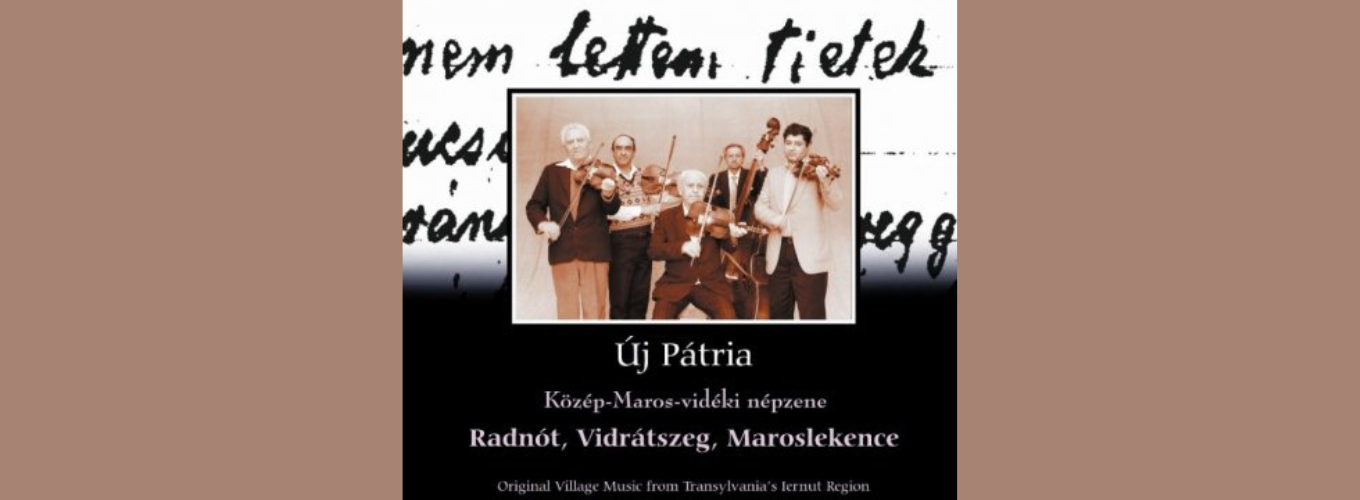
Közép-Maros-vidéki népzene - Original Village Music from Transylvania’s Iernut Region - New Patria series
It is an ethnically mixed area with Romanians, Hungarians and Gypsies living together. The majority of local Gypsies belong to the Romungro ethnic group with a sense of Hungarian origin. Many of them however do not speak Hungarian any more, using Romanian as a second language to their native Romungro dialect and most are Eastern Orthodox, having adapted to the Romanian majority in their religion as well.
A secondary group of local Gypsies are called Corturar or Muntean by their Romungro peers. In contrast to Romungros who lead settled lives, Corturars are nomadic or at least have a sense of being descendants of nomadic Gypsies. There are also differences between Romungros and Corturars in terms of their dialects.
1. Purtata, ponturi, învârtita, haţegana (Táncrend) (Dance cycle) 15’14”
2. De chiuit la nuntă sau chemare la clacă (Lakodalmi mars vagy kalákába hajtó)
(Wedding march or invitation for communal work) 5’09”
3. Hora mortului şi învârtită la clacă (Halotti keserves és forgatós tánc kalákában)
(Mock mourning complaint and turning dance during communal work) 1’59”
4. Jocul miresii (Menyasszonytánc) (Bride’s dance) 4’06”
5. Învârtita din gura şurii (A csűrbejáratnál játszott forgatós táncdallam)
(Turning dance played at the barn door) 2’39”
6. Marş morţesc (Halotti mars) (Funeral processional) 1’48”
7. Învârtita cimpoilor la Dătăşeni (Marosdátosi dudautánzó forgatós táncdallam)
(Bagpipe-imitating turning dance tune from Dătăşeni) 3’05”
Nyárádtő környéke – Ungheni Region
8. Şebeş (Gyors párostánc) (Fast couple dance) 4’19”
Cserged patak mente – Cerghid Valley
9. De botă (Botos tánc) (Men’ stick dance) 1’44”
Felső-Vízmellék – Târnave Region
10. Învârtita, haţegana (Táncrend) (Dance cycle) 5’44”
Magyar népzene – Hungarian folk music
Közép-Maros vidéke (Iernut Region)
11. Székelyverbunk (Slow men’s solo dance) 3’52”
12. Asztali nóta (Table tune) 3’47”
13. Székelyverbunk, sűrű verbunk (Slow and fast men’s solo dance) 9’18”
14. Kéthúros lassú csárdás (“Two-stringed” slow csárdás) 2’38”
Cigány népzene – Gypsy folk music
15. Romungro asztali nóta (Romungro Gypsy table tune) 2’38”
16. Szénaverősi csárdás (Gypsy csárdás from Senereuş) 2’19”
17. Sátorosok keservese (Nomadic Gypsies’ complaint) 1’44”
Összidő (Total time) 72’02”
Válogatta / Selected by: PÁVAI István
ADATKÖZLŐK / PERFORMERS – INFORMANTS
BOCA Gheorghe (Vidrátszeg, 1926) – hegedű (bal sáv) / violin (left channel)
BOCA Sorin (Marosvásárhely, 1969) – hegedű, ének (jobb sáv) / violin, voice
(right channel)
VINCA Iulius (Küküllőszéplak, 1926) – háromhúros kontra (bal sáv) / 3-stringed viola (left channel)
VINCA Gheorghe (Iernut, 1959) – háromhúros kontra (jobb sáv) / 3-stringed viola
(right channel)
VARGA Remus (1934) – nagybőgő / double bass